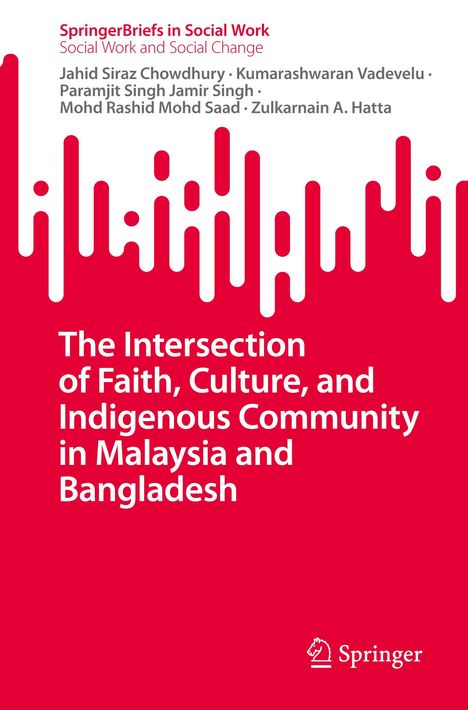Jahid Siraz Chowdhury: The Intersection of Faith, Culture, and Indigenous Community in Malaysia and Bangladesh, Kartoniert / Broschiert
The Intersection of Faith, Culture, and Indigenous Community in Malaysia and Bangladesh
(soweit verfügbar beim Lieferanten)
- Verlag:
- Springer Nature Switzerland, 11/2024
- Einband:
- Kartoniert / Broschiert, Paperback
- Sprache:
- Englisch
- ISBN-13:
- 9783031742996
- Artikelnummer:
- 12109891
- Umfang:
- 148 Seiten
- Gewicht:
- 236 g
- Maße:
- 235 x 155 mm
- Stärke:
- 9 mm
- Erscheinungstermin:
- 16.11.2024
- Hinweis
-
Achtung: Artikel ist nicht in deutscher Sprache!
Klappentext
This book is a comprehensive study of the intersection of religion, Indigenous culture, and community life, featuring an in-depth examination of the Orang Asli in Malaysia and the Santals in Bangladesh that aims for a socially inclusive, harmonious, and peaceful society. It dives into the impact of conversion on Indigenous identities, employing extensive ethnographic and phenomenological methodologies. The authors explore the conversion process attentively, revealing hidden isolation.
This compact volume offers intriguing insights into Southeast and South Asia's rich tapestry, including nuance to discussions concerning religious pluralism, human rights, and the pursuit of social justice. Readers gain a better understanding of varied religious communities and Indigenous perspectives in order to promote a more inclusive and fair society. In the book, the authors provide real-life experiences, extensive analysis, and practical solutions for Indigenous populations in Malaysia and Bangladesh. They blend together thoughts and narratives, encompassing sociopolitical and historical themes. With visuals, case studies, and varied views, the volume builds respect for global variety while driving societal inclusion with the spirit of the sustainable development goals (SDGs).
The Intersection of Faith, Culture, and Indigenous Community in Malaysia and Bangladesh addresses pressing social justice and human rights issues, pushing for rights-based society and diversity, while balancing academic rigor and accessibility. The book is intended for scholars and researchers interested in Indigenous peoples, religious conversion, social justice, and human rights. It offers detailed insights into the conversion experiences of Malaysian Orang Asli and Bangladeshi Santal groups, and provides commentary on civil freedoms following conversion and reveals complex views of these communities, making the volume useful for scholars researching intersectionality in religious conversions and the dynamics surrounding Indigenous populations. Policymakers in Malaysia, Bangladesh, and other Asian countries dealing with comparable concerns with converted Indigenous people might benefit from the book's evidence-based insights and challenges, promoting more inclusive and culturally sensitive policies and urging Malaysian and Bangladeshi governments to recognize conversion-related issues.

